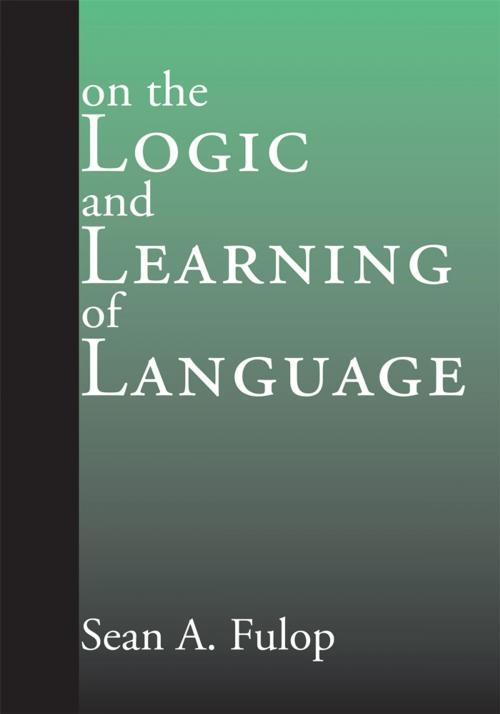On the Logic and Learning of Language
Nonfiction, Science & Nature, Science, Physics, Mathematical Physics, Reference & Language, Language Arts, Linguistics| Author: | Sean A. Fulop | ISBN: | 9781412222181 |
| Publisher: | Trafford Publishing | Publication: | October 14, 2004 |
| Imprint: | Trafford Publishing | Language: | English |
| Author: | Sean A. Fulop |
| ISBN: | 9781412222181 |
| Publisher: | Trafford Publishing |
| Publication: | October 14, 2004 |
| Imprint: | Trafford Publishing |
| Language: | English |
This book presents the author's research on automatic learning procedures for categorial grammars of natural languages. The research program spans a number of intertwined disciplines, including syntax, semantics, learnability theory, logic, and computer science. The theoretical framework employed is an extension of categorial grammar that has come to be called multimodal or type-logical grammar. The first part of the book presents an expository summary of how grammatical sentences of any language can be deduced with a specially designed logical calculus that treats syntactic categories as its formulae. Some such Universal Type Logic is posited to underlie the human language faculty, and all linguistic variation is captured by the different systems of semantic and syntactic categories which are assigned in the lexicons of different languages. The remainder of the book is devoted to the explicit formal development of computer algorithms which can learn the lexicons of type logical grammars from learning samples of annotated sentences. The annotations consist of semantic terms expressed in the lambda calculus, and may also include an unlabeled tree-structuring over the sentence.
The major features of the research include the following:
We show how the assumption of a universal linguistic component---the logic of language---is not incompatible with the conviction that every language needs a different system of syntactic and semantic categories for its proper description.
The supposedly universal linguistic categories descending from antiquity (noun, verb, etc.) are summarily discarded.
Languages are here modeled as consisting primarily of sentence trees labeled with semantic structures; a new mathematical class of such term-labeled tree languages is developed which cross-cuts the well-known Chomsky hierarchy and provides a formal restrictive condition on the nature of human languages.
The human language acquisition mechanism is postulated to be biased, such that it assumes all input language samples are drawn from the above "syntactically homogeneous" class; in this way, the universal features of human languages arise not just from the innate logic of language, but also from the innate biases which govern language learning.
This project represents the first complete explicit attempt to model the aquisition of human language since Steve Pinker's groundbreaking 1984 publication, "Language Learnability and Language Development."
This book presents the author's research on automatic learning procedures for categorial grammars of natural languages. The research program spans a number of intertwined disciplines, including syntax, semantics, learnability theory, logic, and computer science. The theoretical framework employed is an extension of categorial grammar that has come to be called multimodal or type-logical grammar. The first part of the book presents an expository summary of how grammatical sentences of any language can be deduced with a specially designed logical calculus that treats syntactic categories as its formulae. Some such Universal Type Logic is posited to underlie the human language faculty, and all linguistic variation is captured by the different systems of semantic and syntactic categories which are assigned in the lexicons of different languages. The remainder of the book is devoted to the explicit formal development of computer algorithms which can learn the lexicons of type logical grammars from learning samples of annotated sentences. The annotations consist of semantic terms expressed in the lambda calculus, and may also include an unlabeled tree-structuring over the sentence.
The major features of the research include the following:
We show how the assumption of a universal linguistic component---the logic of language---is not incompatible with the conviction that every language needs a different system of syntactic and semantic categories for its proper description.
The supposedly universal linguistic categories descending from antiquity (noun, verb, etc.) are summarily discarded.
Languages are here modeled as consisting primarily of sentence trees labeled with semantic structures; a new mathematical class of such term-labeled tree languages is developed which cross-cuts the well-known Chomsky hierarchy and provides a formal restrictive condition on the nature of human languages.
The human language acquisition mechanism is postulated to be biased, such that it assumes all input language samples are drawn from the above "syntactically homogeneous" class; in this way, the universal features of human languages arise not just from the innate logic of language, but also from the innate biases which govern language learning.
This project represents the first complete explicit attempt to model the aquisition of human language since Steve Pinker's groundbreaking 1984 publication, "Language Learnability and Language Development."















